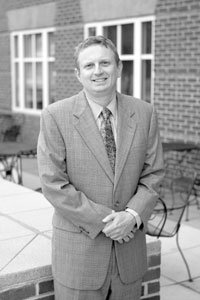NEWS- Bob and weave: Suspect name delays Johnson's travel
Bob Johnson's name has always gotten him into trouble.
"In high school, there were three Robert Johnsons in my homeroom," he recalls, "and when they would call over the loudspeaker for Robert Johnson to report to the principal's office, all three of us would have to go and ask 'which one?'"
Decades later, in spite of building a reputation as a monetary expert, including a stint as a college professor, Johnson is still getting called to the office. Only now it happens at airports.
"I get stopped literally every time," says Johnson. "Invariably, there's a red or yellow mark on my landing card, and I'm waved over to a section where they go through my luggage and ask me all kinds of questions– oddball questions like 'Have you ever lived in Madison, Wisconsin?'"
Since 1996, Johnson has been a managing director of the CFA Institute, a company that administers an exam to certify financial analysts around the world. The work has made him a frequent international flier. Since 9/11, he says he has been consistently pulled aside by Customs and Border Protection agents when he returns to the U.S.
"When you're coming back from a long business trip and you finally land at Dulles and that's where you're being held up, it tries your patience," he says. "It's funny to have people look at you like you're a criminal, but you just learn to live with it."
Johnson never knew why he was the subject of such scrutiny until CBS News aired a report on the October 8 edition of 60 Minutes with details about the Transportation Security Administration's "No-Fly List." On the show, 12 other men named Robert Johnson reported that they, too, had been singled out at airports.
That's because, back in 1994, a man using the alias Robert Johnson was convicted of plotting to bomb a Hindu temple and a movie theater in Toronto. And while that Bob Johnson was deported to Trinidad this year, the CBS report notes that the No-Fly List does not differentiate the convicted terrorist from the hundreds of Robert Johnsons who are harmless business travelers.
"I realize these people are doing a difficult job, and the folks at Dulles have been very understanding," Johnson says. "But I wish they were armed with 21st century tools."
Customs and Border Protection spokesperson Kelly Klundt confirms that the No-Fly List is one of 22 factors used to determine who is subjected to additional or "secondary" screening. And she says that name alone is often reason enough for someone to be detained.
Though he's never had to undergo anything as invasive as a strip search, Johnson says it's "a nuisance" to be regularly taken into a separate room to be questioned and have his luggage inspected.
"If someone has the same or a similar name to someone on one of the lists, they may be required to go through secondary inspection for verification of identity and citizenship to make sure they don't pose a threat to the country," says Klundt. She notes there are ways for Bob Johnsons to avoid this.
"Individuals who have a similar name can file a FOIA [Freedom of Information Act petition], and we'll go through the proper channels," she explains. "Or they can ask to speak with a [Customs] supervisor, and we also have customer service representatives."
Ultimately, Klundt says, it's her agency's hope that people with frequently mistaken identities like Johnson will alert her agency to the problem.
"It's mutually beneficial so we can identify and focus on the real bad guys and not on the 99.9 percent of travelers who are just going about their business," she says.
When that happens, maybe Johnson will be able to stay out of the CBP's office and out of trouble.

Would this Charlottesville executive plot to bomb a Toronto temple?
PHOTO BY WILL WALKER
#